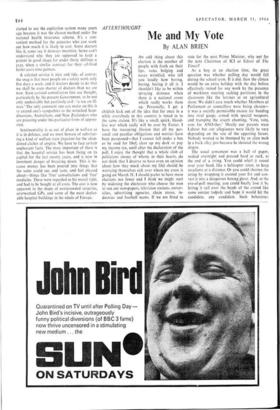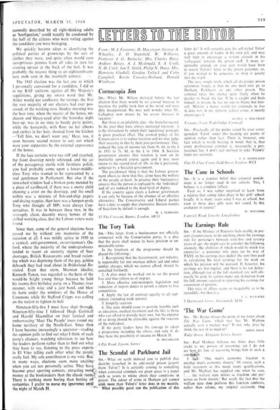AFTERTHOUGHT
Me and My Vote
By ALAN BRIEN
AN odd thing about this election is the number of people with froth on their lips, veins bulging and noses wrinkled, who tell you loudly how boring, boring, boring it all is. I shouldn't like to be within spraying distance when there is a national event which really works them up. Personally, I get a childish kick out of the idea that for once in a while everybody in this country is tuned in to the same station. It's like a small, quick, blood- less war which really will be over by Easter. I have the reassuring illusion that all my per- sonal and peculiar obligations and worries have been postponed—that I cannot fall under a bus or be sued for libel, clear up my desk or pay my income tax, until after the declaration of the poll. I enjoy the thought that a whole club of politicians (many of whom, in their hearts, do not think that I deserve to have even an opinion about how they muck about my life) should be worrying themselves sick over where my cross is going on March 31. I should prefer to have more elections not fewer and I think we might start by widening the electorate who choose the men to run our newspapers, television stations, univer- sities, advertising agencies, chain stores, in- dustries and football teams. If we are fitted to vote for the next Prime Minister, why not for the next Chairman of ICI or Editor of The Times?
As a boy at an election time, the great question was whether polling day would fall during the school term. If it did, then the climax would be an extra holiday with the day before effectively ruined for any work by the presence of workmen erecting sacking partitions in the classroom like the latrines at an agricultural show. We didn't care much whether Members of Parliament or councillors were being chosen— it was a socially permissible excuse for banding into rival gangs, armed with special weapons, and tramping the streets chanting, 'Vote, vote, vote for ANO-ther.' Mostly our parents were Labour but our allegiances were likely to vary depending on the size of the opposing forces. Nobody wanted to be thumped by an alien mob in a back alley just because he shouted the wrong slogan.
The usual armament was a ball of paper, soaked overnight and pressed hard as rock, at the end of a string. You could whirl it round over your head, like a helicopter rotor, to keep assailants at a distance. Or you could shorten the string by wrapping it around your fist and con- vert it into a dangerous boxing glove. And, at the eve-of-poll meeting, you could finally lose it by letting it sail over the heads of the crowd like some outsize tadpole and hope it would hit the candidate, any candidate. Such behaviour, normally described by all right-thinking adults as 'hooliganism,' could usually be condoned by the half of the citizens who were voting against the candidate you were besieging.
We quickly became adept at identifying the political parties of grown-ups by the sort of clothes they wore, and quite often would earn surreptitious pennies from all sides in turn for creating uproar at the back of the hall. It was probably the nearest thing to an eighteenth-cen- tury mob seen in the twentieth century.
The 1945 election was the last one at which
I personally canvassed for a candidate. I did so in my RAF uniform, against all His Majesty's regulations, giving my sworn word that Mr. Attlee would not confiscate the savings, the first the vast majority of our electors had ever pos- sessed, of the working man. Sunday morning was the best time, when the master of the house, un- shaven and bleary-eyed after the Saturday night beer-up, was in no state to bandy party points, while the housewife, with flour on her elbows and curlers in her hair, shouted from the kitchen --Tell him, we don't want any.' Here, toco, it soon became second nature to sort out which were your supporters by the external appearance of the house.
If the lace curtains were too stiff and starched, the front doorstep newly whitened, and the air of the passageway sterile with furniture polisb, you had probably come upon a lower-middle- class Tory who wanted to be represented by a real gentleman in Parliament. But also if the unwashed window had a broken pane mended by a piece of cardboard, if there was a snotty child chewing a crust on the doorstep, and the sr nell within was a mixture of fish-and-chip papers and drying nappies, then here was a lumpen-prole Tory who thought all MPs were always Con- servatives. It was in between these two, in the averagely clean, decently messy homes of the skilled working class, that the Labour voters v/ere found.
Since then, some of the general elections have passed me by without any memories of the
occasion at all. I was mildly active in 1950 in
a cynical, anti-government, ex-serviceman's Ox- ford, where the majority of the undergraduates tended to resent an austerity regime of beer shortages, British Restaurants and bread ration- ing which was depriving them of the gay, golden
debauch they had read about in Brideshead Re- visited. Even that stern, Marxian idealist, Kenneth Tynan, was regarded as the hero of the
would-be bright young things because he held his twenty-first birthday party on a Thames river steamer, with wine and a jazz band, and blew its horn under the windows of the House of Commons while Sir Stafford Cripps was calling on the nation to tighten its belt.
Nineteen-fifty-five I must have slept through. Nineteen-fifty-nine I followed Hugh Gaitskell and Harold Macmillan on their farcical and embarrassing 'Meet The People' tours round my home territory of the North-East. Since then I have become increasingly a spectator—reading the opinion polls to find out what I think of each party's chances, watching television to see how' the leaders perform rather than to find out what they have to say, listening to the press experts - in El Vino telling each other what the people_. really feel. My sole contribution is my vote. Buk in many ways, elections seem more exciting, when you are not personally active. They hay become great sporting contests, attracting mo money at the bookmakers than the classic rac There is nothing more boring than betting o certainties. I prefer to nurse my ignorance until the night of March 31.







































 Previous page
Previous page